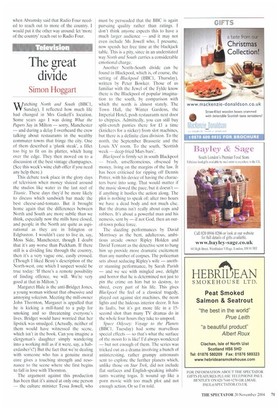The great divide
Simon Hoggart
Watching North and South (BBC1, Sunday), I reflected how much life had changed in Mrs Gaskell's location. Some years ago I was doing What the Papers Say in Milton — sorry, Manchester
— and during a delay I overheard the crew talking about restaurants in the wealthy commuter towns that fringe the city. One of them described a 'plank steak', a fillet too big to fit on its platter, which hung over the edge. They then moved on to a discussion of the best vintage champagnes. (See this week's wine club offer if you need any help there.) This debate took place in the glory days of television when money sluiced around the studios like water in the last reel of Titanic. These days they'd be more likely to discuss which sandwich bar made the best cheese-and-tomato. But it brought home again that the differences between North and South are more subtle than we think, especially now the mills have closed, and people in the North are quite as aspirational as they are in Islington or Edgbaston. I wouldn't care to live in, say, Moss Side, Manchester, though I doubt that it's any worse than Peckham. If there still is a dividing line through the country, then it's a very vague one, easily crossed. (Though I liked Bessy's description of the North-west, one which I suspect would be true today: 'If there's a remote possibility of finding offence, we will. We're very good at that in Milton.)
Margaret Hale is the anti-Bridget Jones, a young woman without that obsessive and annoying solecism. Meeting the mill-owner John Thornton, Margaret is appalled that he is kicking a mill-hand to a pulp for smoking and so threatening everyone's lives. Bridget would have worried that her lipstick was smudged. (Actually, neither of them would have witnessed the scene, which isn't in the book. Can you imagine a clergyman's daughter simply wandering into a working mill as if it were, say, a haberdasher's?) But the fact that we're dealing with someone who has a genuine moral core gives a touching strength and resonance to the scene where she first begins to fall in love with Thornton.
The argument against this production has been that it's aimed at only one person — the culture minister Tessa Jowell, who must be persuaded that the BBC is again pursuing quality rather than ratings. I don't think anyone expects this to have a much larger audience — and it may not even include Ms Jowell who, I presume, now spends her free time at the blackjack table. This is a pity, since in an understated way North and South carries a considerable emotional charge.
Another North–South divide can be found in Blackpool, which is, of course, the setting of Blackpool (BBCI, Thursday), written by Peter Bowker. Those of us familiar with the Jewel of the Fylde know there is the Blackpool of popular imagination to the south, by comparison with which the north is almost stately. The Town Hall, the Winter Gardens, the Imperial Hotel, posh restaurants next door to chippies. Admittedly, you can still buy split-crotch panties there for a time (knickers for a nicker) from slot machines, but there is a definite class division. To the north, the September Brasserie and the Louis XV room. To the south, 'Scottish week — deep-fried Mars bars'.
Blackpool is firmly set in south Blackpool — brash, unselfconscious, obsessed by money, living on the margins of the law. It has been criticised for ripping off Dennis Potter, with his device of having the characters burst into song. That would matter if the music slowed the pace, but it doesn't — if anything it hustles the action along. The plot is nothing to speak of; after two hours we have a dead body and not much else. But the drama isn't really about cops and robbers. It's about a powerful man and his nemesis, sent by — if not God, then an outof-town police force.
The dazzling performances by David Morrissey as the bent, adulterous, ambitious arcade owner Ripley Holden and David Tennant as the detective sent to bang him up provide more dramatic excitement than any number of corpses. The policeman sets about seducing Ripley's wife — another stunning performance, by Sarah Parish — and we see with mingled awe, delight and horror that he is determined not just to pin the crime on him but to destroy, to shred, every part of his life. This gives Blackpool the feel of a classical tragedy, played out against slot machines, the neon lights and the hideous interior decor, It has its faults, but it's got more life in a 15second shot than many TV dramas do in the whole four hours they take to unspool.
Space Odyssey: Voyage to the Planets (BBC1, Tuesday) had some marvellous special effects — so that's what the surface of the moon lo is like! I'd always wondered — but not enough of them. The series was tricked out as a drama involving a bunch of uninteresting, rather grumpy astronauts sent to explore the further planets which, unlike those on Star Trek, did not include flat surfaces and English-speaking inhabitants wearing togas. It wound up like a porn movie with too much plot and not enough action, Or so I'm told.


























































































 Previous page
Previous page